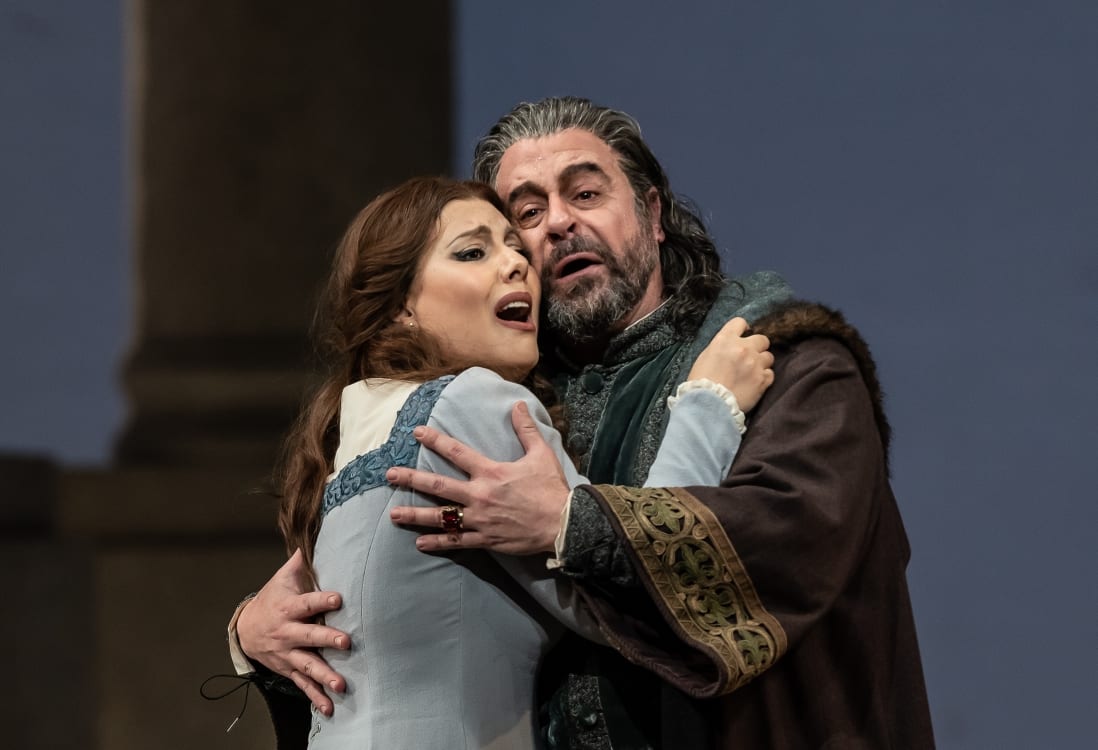Genoa, 14th century is a backdrop to a political, social and personal drama cradled in the agonies of love, machinations, feuds and eventual reconciliation. The current revival of Elijah Moshinsky’s 1991 production of the mature Verdian opera, Simon Boccanegra, is uplifting in its simplicity and literal read of the libretto.
Despite first night’s jitters, and there were a few, the overall production is a triumph.
The recent wedding of Meghan and Prince Harry is a far cry from the tragedy inflicted on young couples falling in love with a person of a different class. Simon Boccanegra is a plebeian, in other words, is middle class. He and Maria, the daughter of a nobleman Jacopo Fiesco, fall in love and have an illegitimate daughter. Her father locks her in; the baby is given to a foster home. Paolo Albiani persuades Simon Boccanegra to accept nomination as a Doge, as this position will endear him to Maria’s father, the nobleman, and will put an end to their separation. Paolo, leading the plebeians, proclaim Simon Boccanegra Doge of Genoa. Triumphant but with a bitter pill – Simon Boccanegra finds Maria dead and learns that his daughter disappeared.
Fast-forward 25 years. Boccanegra meets an orphaned woman named Amelia Grimaldi and discovers she is his long-lost daughter. Paolo is infatuated with the young Amelia but does not know she is Boccanegra’s daughter. He requests the Doge’s blessings for him to marry the girl, which Boccanegra refuses. Amelia’s lover is the nobleman Gabriel Adorno, who is planning a rebellion against Boccanegra, not knowing he is Amelia’s father. The plot thickens with conspiracies, murder and execution. Politics and family drama intertwine, yet the end is not all too gloomy.
Carlos Alvarez in the title role is outstanding. In the prologue, Alvarez’s Boccanegra seems more like a broken man. His voice does not quite ride the orchestral climaxes yet, as he regains power as a statesman and he finds his long-lost daughter, Alvarez’s Boccanegra grows in stature. He mirrors the new dimensions of the character with great concision and no excessive fussing with the vocal line. Even the death scene is gracefully and movingly delivered without the resorting to lachrymose contrivances.
Ferruccio Furlanetto’s Fiesco, Maria’s father, gives a powerful performance throughout. He commands formidable presence demanded by his role.
Francesco Meli’s Gabriel Adorno is superb and totally charming yet impetuous young nobleman. His powerful and expressive tenor voice undulates throughout the auditorium.
The Armenian soprano Hrachuhi Bassenz’s Amelia takes time to settle theatrically and vocally. In the second half, she regained better command over her expressive voice and theatrical ability.
The conductor, Henrik Mánási, has delved into the score, with slowish tempi. Yet, one may read the slowness, in part, as a reflection of the slow passing of time for Simon Boccanegra, a man who lost the love of his life and his daughter.
Moshinski does not attempt to reinterpret the political backdrop as illustrated painstakingly detailed by Verdi. The mere tweaking is shifting the period 50 years forward to achieve the colourful early Renaissance costume. Simon Boccanegra, the historical figure lived at the end of the 14th century, which is late Middle Ages, to early 15th century. The end result of the artistic team’s efforts, in particular, Peter J. Hall’s early Renaissance costume design, inspired by Ghirlandaio and Michael Yeargan’s imaginative set, produce the sublime effect of a period opera that easily resonate with audiences anywhere and at any period.
A thoroughly enjoyable experience, thematically, theatrically and musically. Highly recommended even for newcomers to opera.

